Sustainability champions
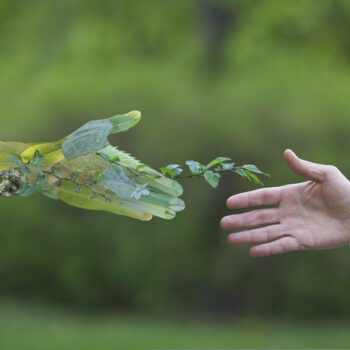
More than nine in ten (95%) people living in Ireland* want to see more done by businesses to protect the environment. With that in mind, Gillian Hamill highlights the brands that have worked hard to offer sustainable solutions
20 March 2024
The 13th edition of the EY Future Consumer Index highlighted the extent to which climate change is a leading concern for global consumers who are now more intentional about what they buy. Published in November 2023, the study which surveyed more than 22,000 consumers across 28 countries, examined consumers’ attitudes to sustainability in detail.
The cost of living (94%) and climate change (89%) are front of mind for consumers. After a year of extreme weather events, consumers are increasingly being confronted with the real-time impacts of a changing climate, the EY Future Consumer Index states. More than four in ten (42%) global consumers report they are thinking of changing the food they eat because climate change has pushed up prices or limited availability, and almost three in ten (29%) say they have been forced to make new choices already. More than two-thirds (67%) of respondents attribute their efforts to drive change to their deep concern for the fragility of the planet.
Interestingly, the report finds differing responses to this concern across the generations. Older generations are more active in adopting lifestyle behaviours to reduce their impact: 65% of baby boomers bring reusable bags to the store compared with just 43% of Gen Z, and 63% of baby boomers recycle or reuse packaging after use, compared with 48% of millennials. Yet, when it comes to spending more sustainably, younger generations are speaking with their wallets and double-checking company claims. Thirty-seven percent of Gen Z indicated that they are willing to pay for more sustainable goods and services compared with 29% of baby boomers. Thirty-one percent of Gen Z have checked the sustainability ratings of products compared with 18% of baby boomers.
Particularly during the past decade, across the board, industry has become cognisant of the need for change. As this feature clearly demonstrates, leading companies have made real strides to lessen their impact on the planet. A recent article from London Packaging Week organisers Easyfairs, highlighted that sustainable packaging has now become well-established. “Study after study shows consumers increasingly actively look for sustainable claims when deciding what to purchase, and they claim to be willing to swap brands and pay more to shop more sustainably. This is borne out by the raw numbers, which show that products making ESG claims have averaged 28% cumulative growth over the past five years compared to 20% for products that made no mention of ESG, according to a McKinsey report,” Easyfairs wrote.
Of course, it is not just in packaging that improvements have occurred. Brands have taken impressive strides to improve sustainability across all aspects of the supply chain. Retailers across Ireland have also made significant investments to improve their sustainability credentials and improve the efficiency of their stores. Examples of this include the installation of solar panels, all-fridge doors, and LED lighting, as well as stocking locally produced, Irish products.
*(Research from not-for-profit, Every Can Counts; published June 2022)
LED lighting the way ahead!
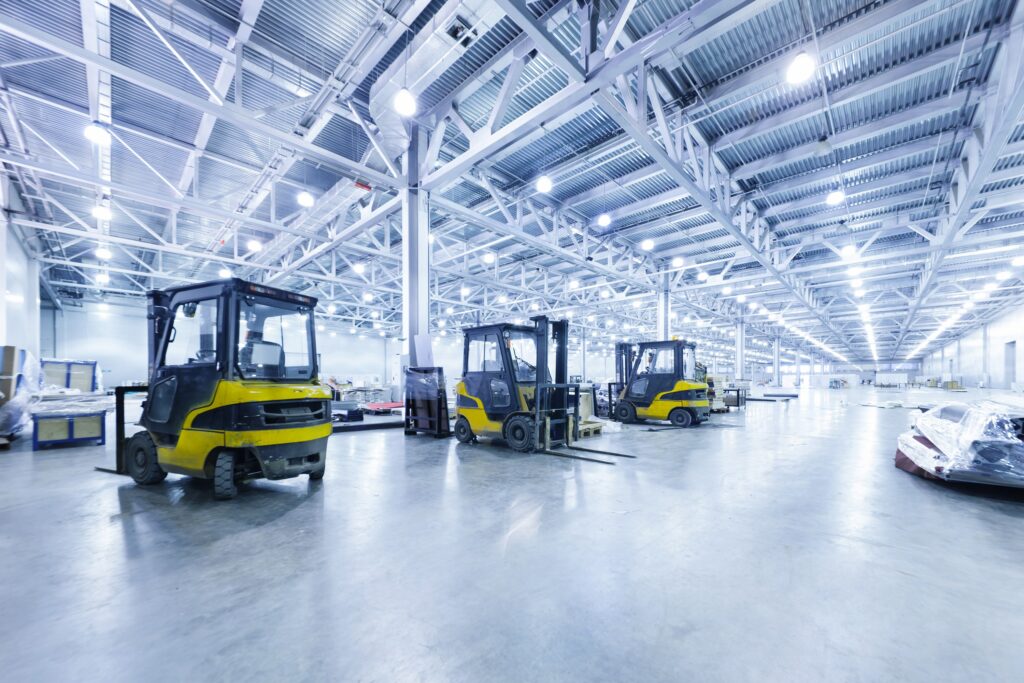
With the EU ban on T5/T8 fluorescent lighting coming into effect from 1 September 2023, now is the perfect time to make the switch to LED lighting. LED light bulbs are more energy-efficient and environmentally friendly compared to traditional incandescent bulbs. There are many advantages to LED lighting, as discussed below:
Advantages of LED lighting:
1. Long life span
LED bulbs have an exceptionally long lifespan compared to traditional bulbs with an average lifespan of about 50,000 hours. For businesses that operate an 8–10 hour day, you’ll only need to change your light bulbs every 14-17 years. When it comes to long life, there’s no better lighting solution out there.
2. Energy efficient
Modern LEDs are the most energy-efficient lighting solution for businesses currently on the market. Waste, in the form of generated heat, is greatly reduced as 90% of electricity can be transformed into light. Less energy is needed to light an LED bulb, thus lowering monthly energy bills for your business.
3. Durable and resistant
LEDs are far more resistant to breakage as they’re based solely on semiconductor materials. The outer layer of bulbs is made from aluminium and plastic, which makes them very durable. They don’t contain any glass, neon tubes, or filaments that could be easily damaged.
4. Safe for employees
LED light bulbs aren’t as hot as traditional bulbs due to low heat production. Employees can rest assured that there’s no risk of getting burned, these bulbs can be safely touched even after long hours of remaining lit.
Secondly, LEDs don’t contain harmful contaminants which makes them less toxic than other commercial lighting solutions.
5. Eco-friendly
As mentioned, there are no toxic materials present. Approximately 95% of materials used to produce this commercial LED light can also be recycled. Businesses can greatly lower their carbon footprint by switching to LED lighting today.
6. Save money
After upgrading your businesses lighting, you’ll see a great reduction in monthly energy bills. Thousands of euros can be saved on electricity costs by making the switch to LED bulbs. Because bulbs can last up to 50,000 hours, money doesn’t have to be spent on regular replacements.
To find out more about a lighting solution upgrade from Energia, visit energia.ie/lighting.
Investing in long-term sustainability
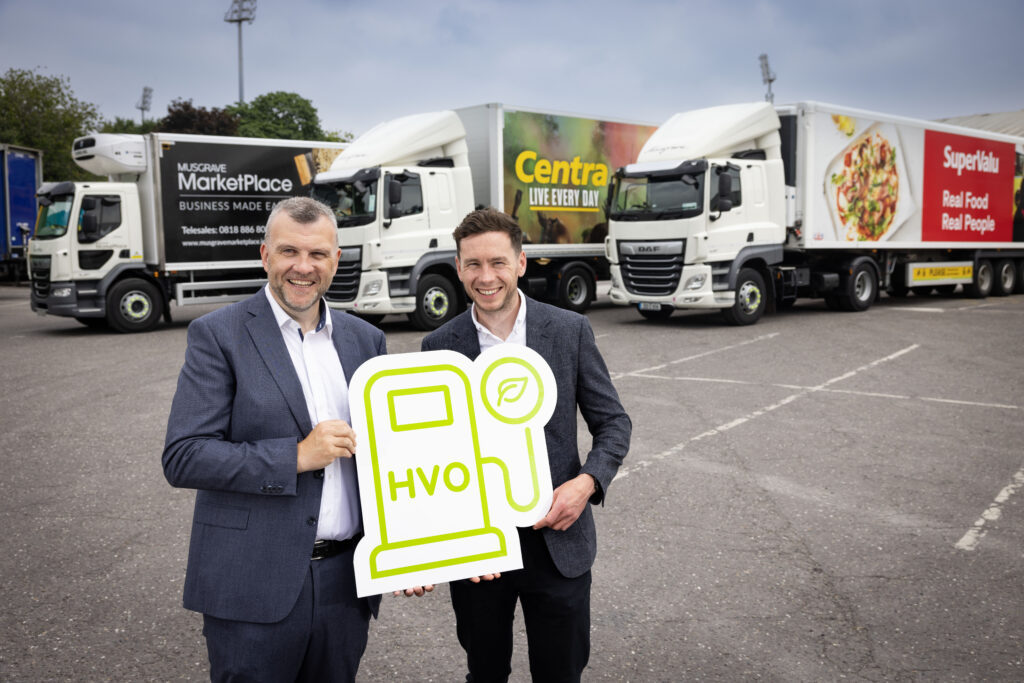
Musgrave, with one of Ireland’s largest business truck fleets, announced last year the rollout of Hydrotreated Vegetable Oil (HVO) fuel, across its network of almost 500 vehicles. By 2030, half of the fleet will operate on alternative fuel, with the ambitious goal of achieving a net-zero fleet by 2040
Musgrave is a sixth-generation, Irish, family-owned business, with a 147-year-old business that has proven itself to be sustainable, having been passed on from generation to generation. Musgrave is a business that wants its businesses and brands to do good in the communities in which they operate. Musgrave’s overarching ambition is to grow a world-class food and beverage business, and in order to do this, Musgrave will continue to invest in its brands, in its partnerships with independent retail partners, and to invest in the long-term sustainability of the business, and society as a whole.
Musgrave’s sustainability ambition is to achieve net zero by 2040, it continues to make progress on its sustainability journey, having successfully achieved its target of 12% carbon reduction across SuperValu and Centra stores last year, following the launch of the Musgrave Sustainability Fund in May 2022. This fund facilitated and supported SuperValu and Centra retailers to invest and incorporate energy saving upgrades into their stores, such as the installation of solar panels, the implementation of fridge doors for energy conservation, LED lighting, and the use of electronic shelf labels. These collective actions show the commitment to reducing their overall climate impact and growing sustainably every day. In line with achieving net zero by 2040, all of Musgrave’s own-brand packaging will be made from recyclable, reusable or compostable material by 2025. SuperValu and Centra have already achieved 97% of this target.
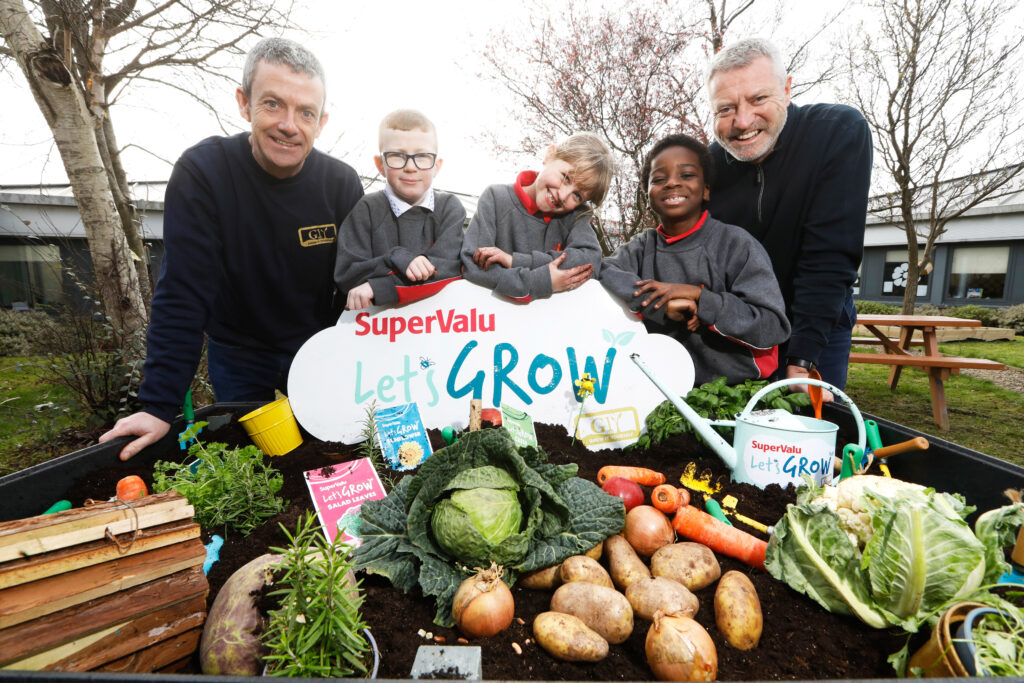
Musgrave’s commitment to sustainability is evident in SuperValu’s partnership with the not-for-profit social enterprise, GIY. By the end of 2024, 100,000 primary school children will have been educated in growing food through the ‘SuperValu Let’s Grow’ initiative, having been supplied with the resources to grow their own fresh food for free at school
Another key step on Musgrave’s journey to net zero, is working and collaborating with suppliers, producers and partners, across the island of Ireland, to deliver an unprecedented reduction in emissions. Musgrave is aware how vital supplier collaboration is to achieve their targets on packaging, biodiversity, circular economy and creating vibrant communities.
Musgrave’s sustainability strategy centres around caring for the planet, creating vibrant communities, and sourcing for good. Building sustainable communities is hugely important. Musgrave’s commitment to sustainability and creating vibrant communities is evident through the SuperValu Tidy Towns competition, which has developed into one of Europe’s largest community sustainability and biodiversity initiative. Over the last 65 years, SuperValu TidyTowns has become a hugely effective and important sustainability initiative in Ireland, both from an environmental and community perspective. Since the inception of the partnership between SuperValu and TidyTowns in 1991, the competition has grown from strength to strength as today there are 1,000 active committees and almost 30,000 volunteers enhancing and improving towns and villages around the country. SuperValu is very excited for the future of SuperValu TidyTowns and confident that it will have a greater role to play in sustainably developing our communities.
Born plant-based!

Danone is working hard to ensure lower footprints for both carbon and land use for Alpro products
Alpro was born plant-based, way back in 1980, and the brand has been banging that big, plant-based drum ever since. Alpro’s goal is the same now as it was then, to make delicious products and help people make positive choices when it comes to food, aligning with its parent company, Danone’s ‘One Planet One Health’ mission.
The business is proud to have been a certified B Corp company since 2018. The company is part of a global movement that believes businesses can be a force for good in society, and should do things in a caring, sustainable way that has a positive impact on people and planet.
Sustainability is important to the company, and it is working hard to ensure lower footprints for both carbon and land use for Alpro products. It is aware that some ingredients have high water consumption (such as almond and coconut) and therefore continues to work to source sustainably grown ingredients and to further reduce its environmental impact.
As well as being selective about our ingredients, the business is always trying hard to make the way it produces foods even more sustainable too. Alpro’s almonds come exclusively from farms around the Mediterranean and all its soya is rainforest (and GMO) free. Most is grown right here in Europe (in France, Belgium and The Netherlands), the rest comes from Canada. With targets firmly in place, the business is continually exploring better ways to improve its process and packaging. Alpro is on a journey towards sustainable sourcing, which it turn, helps the business to be more sustainably produced; a double win! With 40 years of leading the food revolution, here’s to the plant-based future with even more irresistibly tasty foods!
Vape retailer compliance urged to avoid fines of up to €2,000

Elizabeth O’Reilly, head of Environmental Compliance at WEEE Ireland
WEEE Ireland is warning retailers to be vigilant about the regulatory landscape surrounding disposable and rechargeable vape devices and e-cigarettes, as non-compliance could result in significant fines and legal consequences.
Launching its Vape Retailer Compliance Awareness campaign, the e-waste and battery recycling scheme said that purchasing vapes from an unregistered supplier could lead to fines ranging from €500 to €2,000 from the Environmental Protection Agency (EPA).
Enforcement campaigns are currently underway across the distribution and retail sector to ensure companies supplying e-cigarettes and vape devices are in compliance with the regulations.
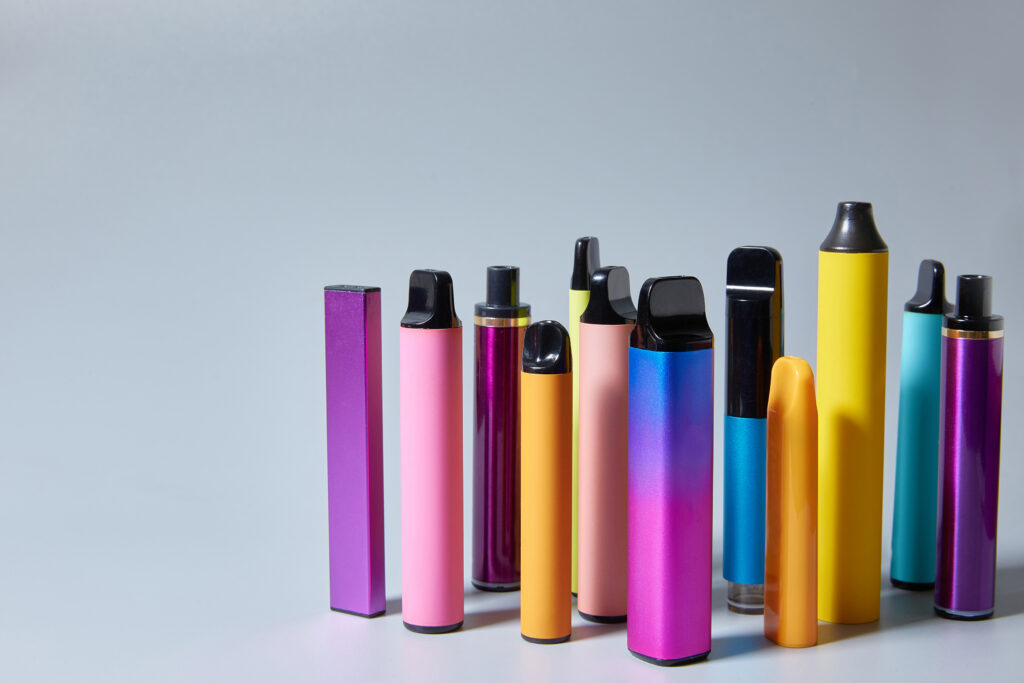
Purchasing vapes from an unregistered supplier could lead to fines ranging from €500 to €2,000 from the Environmental Protection Agency (EPA)
“Disposable and rechargeable vapes, as well as e-cigarette devices and their batteries, fall under the scope of the European WEEE Directive, European Battery Regulations, and Irish WEEE Regulations,” said Elizabeth O’Reilly, head of Environmental Compliance at WEEE Ireland.
“Some importers may not be meeting their legal obligations and acting at an illegal competitive advantage over compliant producers.
“For distributors and retailers, purchasing products from an unregistered supply chain can incur extended producer responsibility under these regulations.
“This includes registration with the Producer Register Ltd, reporting monthly sales in Ireland, and financing take-back and recycling solutions for waste vapes and batteries from end-users.
“We encourage distributors and retailers to review new and existing supply chains and request confirmation of EEE and Battery Producer Registration in Ireland as part of procurement due diligence.
“Supplying unregistered products to other retailers or directly to consumers can lead to breaches of regulations and enforcement action.”
To support compliance, WEEE Ireland said retailers should check if their supplier is registered as a Producer on the PRL website (www.producerregister.ie/producers).
Speaking of a retailer’s recycling obligations when it comes to vape devices, O’Reilly said it is essential for retailers to understand that so called disposable or single-use, and rechargeable vape devices contain batteries and are categorised as Electronic and Electrical Equipment (EEE) products.
“Like any used electronic item, vapes can and should be recycled at the end of their life cycle. Retailers are obligated to take these back on a one-for-one, like-for-like basis in-store or on delivery,” said O’Reilly.
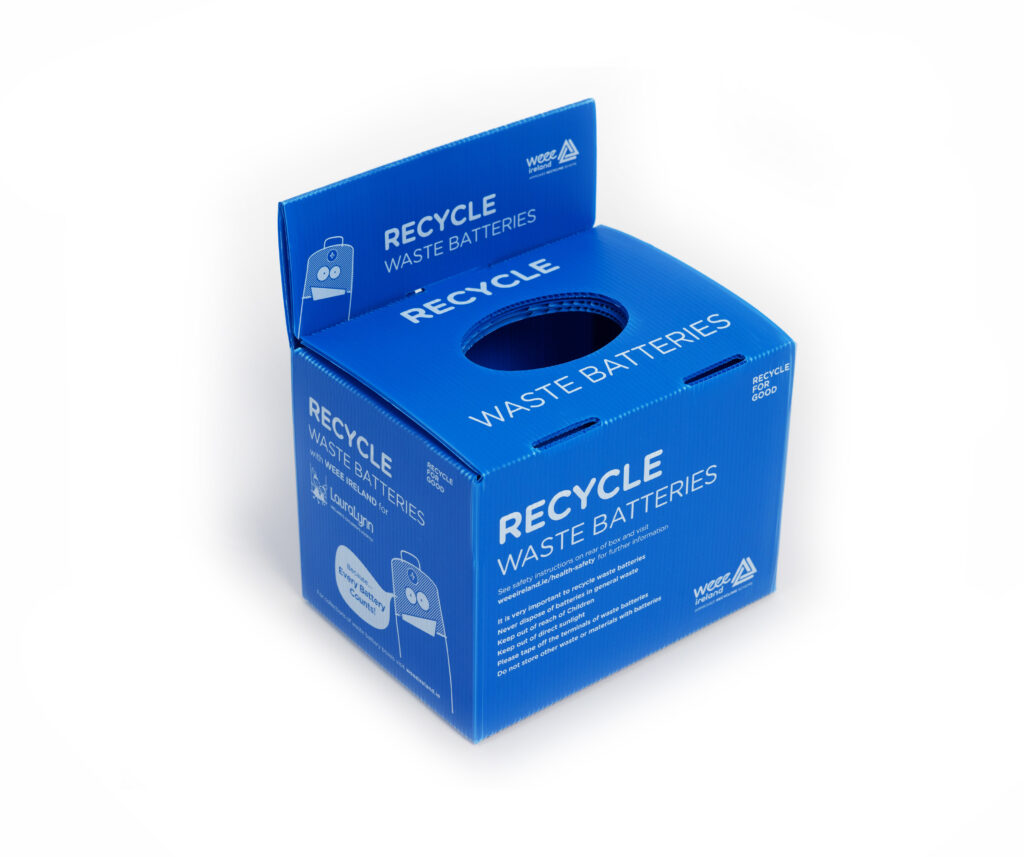
WEEE Ireland facilitates the collective take back of vaping e-waste for free recycling, via its Blue Battery Box System
“WEEE Ireland facilitates the collective take back of this e-waste for free recycling, via our Blue Battery Box System. These boxes are available for delivery and collection to retailers free of charge, to retailers to ensure the easy recycling of these waste devices.”
“Authorised waste electrical and battery recycling protects the environment and human health, supports climate action, and ensures the recovery of valuable resources.
“We encourage retailers to participate in registered supply chains for electrical equipment and batteries, supporting responsible recycling to prevent resources from going to landfill, being illegally dumped, exported, or handled by unauthorised operators, and having a significant environmental impact.”
For more information, visit WEEE Ireland’s Vape and E-Cigarette Device Recycling page at: https://www.weeeireland.ie/vape-e-cigarette-device-recycling/
More information on Fixed Penalty Notices can be found on the EPA website at: https://www.epa.ie/our-services/compliance–enforcement/waste/weee/weee-and-batteries—fixed-payment-notices/.
Ireland’s first zero energy emissions spirit
Ahascragh Distillery in Galway has announced a significant milestone for sustainability in the Irish drinks industry with the introduction of Ireland’s first zero energy emissions spirit. ‘New Born’, the first new-make spirit from Ahascragh Distillery can be classified as zero energy emissions as fossil fuels or gas are not used to drive the production process in the purpose-made distillery. This is a first for the industry.
Nestled in the village of Ahascragh in the heart of County Galway, Ahascragh Distillery is Ireland’s first eco-distillery as it is powered exclusively by renewable energy. Housed in a newly renovated mill, Ahascragh Distillery has changed the way whiskey is made in Ireland through the innovative use of wind and solar energy combined with very high temperature heat pump technology coupled with optimal heat recovery and energy storage systems.
This milestone is underpinned by years of hard work to get to this point by Ahascragh Distillery founders, Gareth and Michelle McAllister.
While waiting on the first spirit to flow from the distillery, the McAllister’s brought their award-winning sourced Family Bond series of hand-selected releases to market; which includes Clan Colla Irish Whiskey, UAIS Irish Whiskey and Xin Gin. Upon reaching maturation, the zero energy emissions ‘New Born’ spirit will first flow into UAIS.
Committed to limiting food waste
BWG Foods, one of Ireland’s leading wholesale and retail operations, is very conscious of the role food waste plays in reducing carbon emissions and is committed to supporting initiatives such as Ireland’s Food Waste Charter, which is a national initiative led by the EPA. BWG Foods has been a committed signatory of the EPA Food Waste Charter since 2017. Food waste is a key priority in BWG’s ESG initiatives, including:
- Foodcloud: BWG has partnered with Foodcloud since 2015 and has donated 313.7 tonnes of surplus product equivalent to 747,023 meals and over 1,000 tonnes of CO2 equivalent avoided. BWG Foods expanded its network of donation sites across four branches of its Value Centre network in 2023 as part of its ESG commitments.
- Waste management: BWG’s waste management solutions facilitate the redirection of food not fit for donation to be processed by anaerobic digestion allowing waste to be converted into energy.
- Too Good to Go: BWG partnered with Too Good to Go in 2020 with an initial trial of four stores. A total of 41 stores are now signed up across the BWG network. This has equated to 7,959 meals donated to date, with an equivalent to 19,897kg of CO2 BWG has plans to expand the partnership with its retail brands, Spar, Eurospar, Mace, Londis and XL.
As a commitment to its waste management strategy, BWG works very closely with its various waste partners and is committed to a waste reduction of 3% each year as part of its current Origin Green commitments.
‘New Food’ alternatives can meet demand for more sustainable food
With 60% more food needed to feed the world’s growing population by 2050, Ida Svensson, transformation manager, New Food, Tetra Pak, examines how ‘new foods’ can help meet this demand
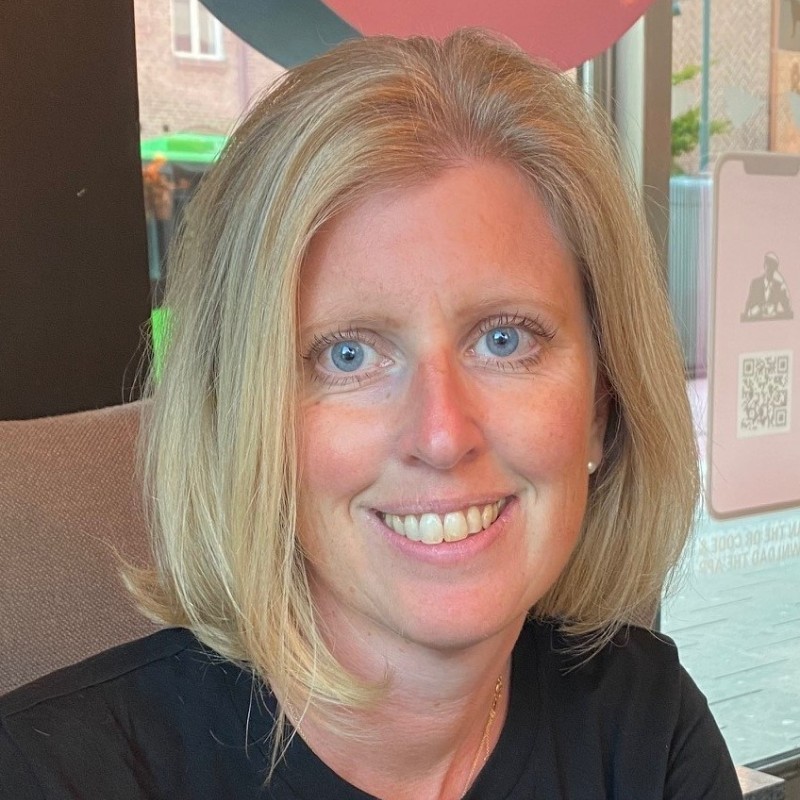
Ida Svensson
Demand for more sustainable food is growing, with recent research by Tetra Pak finding almost half (47%) of UK consumers now consider the environment when buying food. Despite this, the food system still accounts for one third of greenhouse gas emissions worldwide – while 60% more food will be needed to feed the world’s growing population by 2050.
We must therefore find ways of meeting this demand, while also managing this pressure on global food supplies. But how can this be done?
Introducing “new food” alternatives
Supplementing ongoing innovations in the dairy and agricultural industries with ‘new foods’ that are less dependent on agriculture is one way of meeting this demand. This includes developing alternatives to both animal and plant-based protein sources to compliment the ones we already have, such as fish or soy.
One example is biomass fermentation, in which micro-organisms are grown and harvested in a bioreactor. These bioreactors can create ingredients to mimic and replace products such as chicken nuggets, providing an effective alternative to animal proteins while also meeting consumer requirements on taste and texture.
Another option is precision fermentation, where micro-organisms are used as a ‘factory’ to produce specific ingredients such as proteins, vitamins or fat that can then serve as functional ingredients in food production. This cutting-edge innovation is rapidly growing in popularity, with investment reaching almost $3.7 billion between 2012 and 2022 alone.
Our future global food system
With demand for more sustainable food continuing to grow, it’s important we find ways of reducing our food system’s impact on the environment. Alternative methods of food sourcing and production can meet this need, contributing to the creation of a more secure food system in future.
All-sustainable wine portfolio
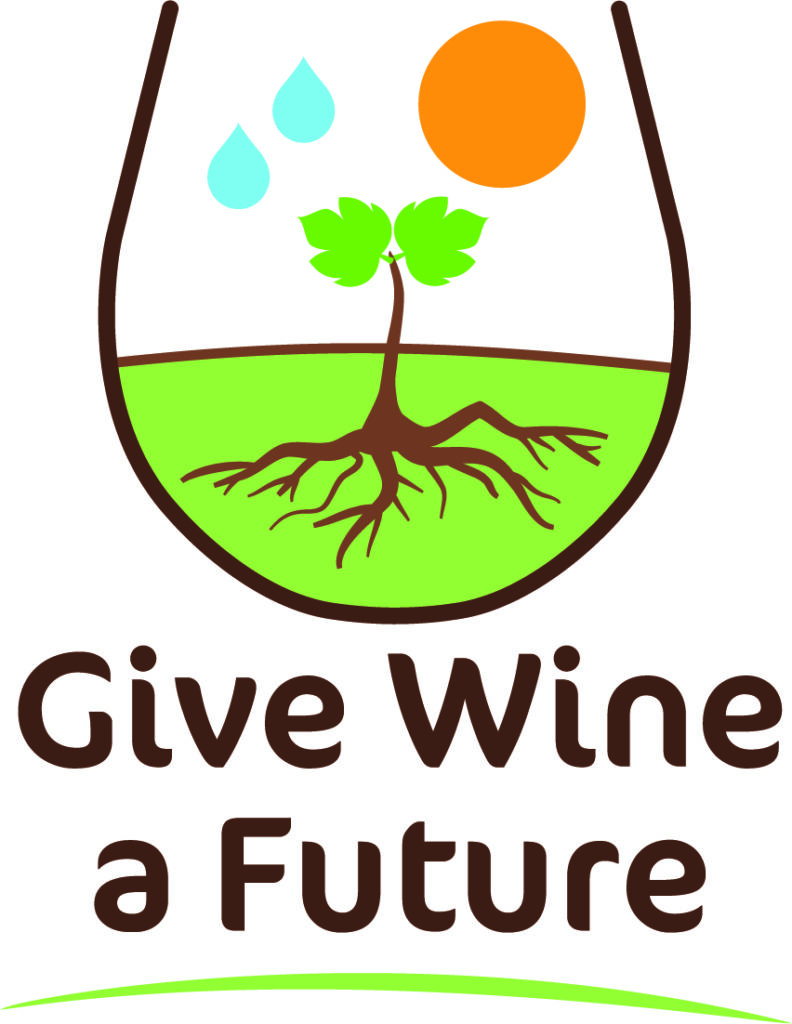
Findlater & Co’s Give Wine a Future movement emerged from the urgent need for Ireland’s wine industry to confront climate change
Findlater & Co is proudly announcing a significant shift in its business approach: starting this year, its portfolio will exclusively feature sustainable wineries. This move signifies the company’s strong commitment to environmental responsibility and its leadership role in guiding the wine industry towards a more sustainable future.
The decision is in line with its Give Wine A Future movement, which was established in 2021 in response to the climate emergency, supporting wine producers who positively impact the environment.
The Give Wine a Future movement emerged from the urgent need for Ireland’s wine industry to confront climate change. With Europe facing severe climate-related events like wildfires, floods, heatwaves, and drought, immediate action is crucial to prevent escalating this crisis.
To celebrate this milestone and discuss the opportunities of this strategic change, Findlater & Co was excited to host the second Give Wine A Future portfolio tasting event on 5 March at The Shelbourne. This trade-only event served as a platform for industry leaders, sustainability experts, and trade customers to explore sustainable viticulture and discuss the future of wine.
The event featured themed seminars, tastings, and discussions led by renowned wine experts and sustainability advocates, showcasing wines that meet the highest quality standards and reflect environmental stewardship.
Findlater & Co believes that collective efforts can drive meaningful change in the face of the climate crisis. Its commitment to a fully sustainable wine portfolio is a step towards this goal.
Leading the way for vape recycling
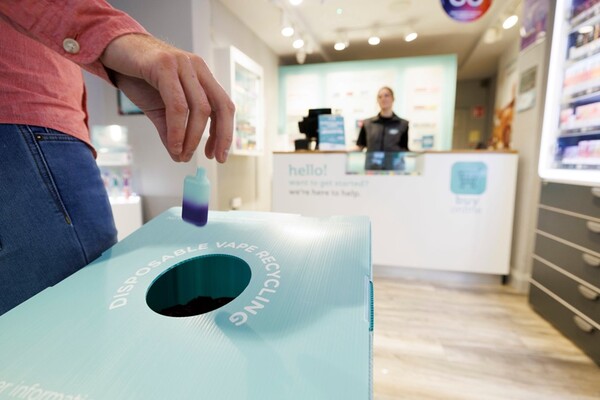
Hale Vaping contributes to WEEE Ireland for every vaping device it sells
Founded in 2013 to support smokers that want to quit, and entirely Irish owned, Hale Vaping distributes and sells a wide range of vaping devices and e-liquids with its partners in the supermarket, convenience and forecourt retail sectors, and through its own Hale-branded stores and franchisees.
The recent increase in popularity of single use vaping devices – commonly referred to as ‘disposables’ – has created concerns around their environmental impacts and what are the best ways to recover and recycle these products. Vaping devices are considered waste electronic and electrical equipment (or WEEE) under waste management regulations because they contain a battery. They also contain plastics, some metals and very small amounts of residue, food grade, e-liquids.
Used vapes should and can be returned to any retail outlet and placed in one of the blue battery recycling boxes provided by WEEE Ireland. These are widely available right across the retail sector. These boxes are collected and emptied by WEEE Ireland and the used vapes are processed into their different parts and recycled. Recent research has shown that up to 80% of the materials in disposable vapes can be successfully recycled.
As market leader, Hape Vaping is working with WEEE Ireland to increase awareness among consumers that the blue boxes can be used for waste vaping devices, including disposables. This will involve signage and additional information on the blue boxes to make this clearer. Hale is also using larger vape recycling boxes in its stores and across multiple petrol forecourts.
As Ireland’s leading producer and retailer of vaping products, Hale Vaping recognises its responsibilities and support the recovery and recycling of used vaping devices. Hale Vaping contributes to WEEE Ireland for every vaping device it sells to ensure WEEE Ireland has the necessary resources to fund this important programme.
Exceptional commitment to combating climate change
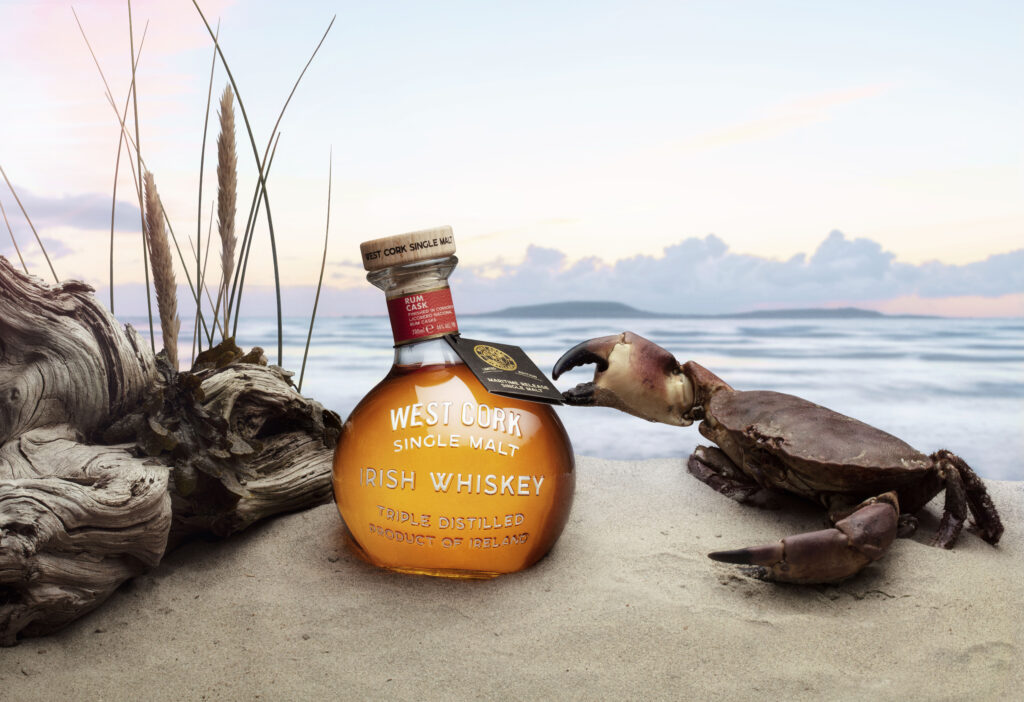
West Cork Distillers has achieved the esteemed Butterfly Mark Certification, awarded by Positive Luxury, which is reserved for businesses demonstrating exceptional commitment to combating climate change
Sustainable practice has been ingrained in the patchwork of West Cork Distillers from the very beginning, shaping decision-making across all levels. When John, Ger and Denis commenced production in Union hall, they believed it was essential to examine their carbon footprint and what they could do to reduce it.
As well as using renewable electricity, West Cork Distillers prioritises minimising waste production as a cornerstone of operations. Its by-products are used to supply animal feed for local farms, and significantly, to create biogas at Timoleague Agri Gen.
Subsequently, the distillery purchases back this green electricity from the national grid. Timoleague also uses its by-products to produce organic fertiliser, bolstering crop growth, particularly barley, a key ingredient in our much-loved whiskey.
West Cork Distillers stands firmly behind its beliefs. So much so, the distillery has become one of the select few companies in Ireland to achieve the esteemed Butterfly Mark Certification, awarded by Positive Luxury. This recognition is reserved for businesses demonstrating exceptional commitment to combating climate change through sustainable practices across all facets of their operations.
Green mindset embedded across operations
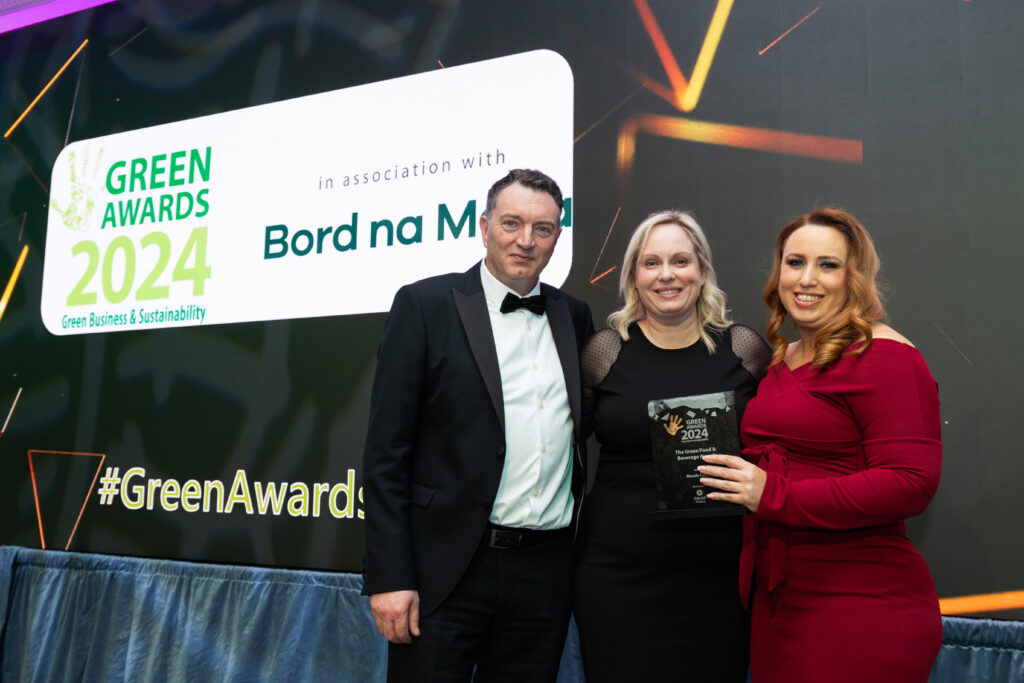
Meade’s commercial manager Rodney Kingston; sponsor Louise Carrick, head of marketing & customer experience at Calor Gas; and business operations manager Eleanor Meade with the Green Food and Beverage Award
In a packed function room at the Clayton Hotel Burlington on Tuesday, 27 February, the Green Awards brought together those in the business community who put sustainability at the top of their agendas. Launched in 2008 as a platform for sustainability intelligence, leadership and innovation in best green practice in Ireland, the Green Awards have since grown in stature and attendance.
Meath-based business Meade Farm won the Green Food and Beverage Award in a highly contested category, where they featured alongside pioneers of sustainable food and drink in Ireland – ABP Food Group, Aurivo, Coca-Cola, Fyffes, O’Brien Fine Foods, Tirlán and Wyeth Nutrition.
“To be in the presence of some of our heroes in the agribusiness and food industry was an honour. We are delighted to receive this recognition,” said Eleanor Meade, business operations manager, who received the award. “Sustainability is at the heart of everything we do, especially in terms of import substitution, waste reduction, energy efficiency and packaging optimisation.”
Meade’s sustainability committee is drawn from all areas of the business, ensuring that a green mindset is embedded in all its operations – growing, packing, distributing and service provision of fresh produce. The judges were impressed with the company’s commitment to import substitution and expansion of its Irish growing operations through strategic partnerships.
Meade Farm has implemented several initiatives to reduce its environmental impact, including: increased Irish sourcing to reduce carbon footprint; addition of 500 kW of solar panels to increase its on-site energy generation; installation of a new potato chitting store to enable earlier planting and harvesting and innovative bio-based crop nutrition trials.
“We have some exciting new initiatives in social sustainability on the way as part of our Bord Bia Origin Green strategic plan and winning an award like this gives us a boost to continue forging ahead!” explains Jeni Meade, communications and sustainability manager.
Employing close to 400 people, Meade Farm is a leading grower of organic and conventional potatoes, carrots, onions and brassicas, sourcing and packing the full range of fresh produce for their retail customers nationwide. Meade Farm’s focus on innovation and sustainability has also led it to produce gluten-free potato starch – a chef and foodie favourite for thickening sauces, soups and stews, binding and coating ingredients, as well as air-frying and baking.
Sustainable viticulture and artisanal excellence
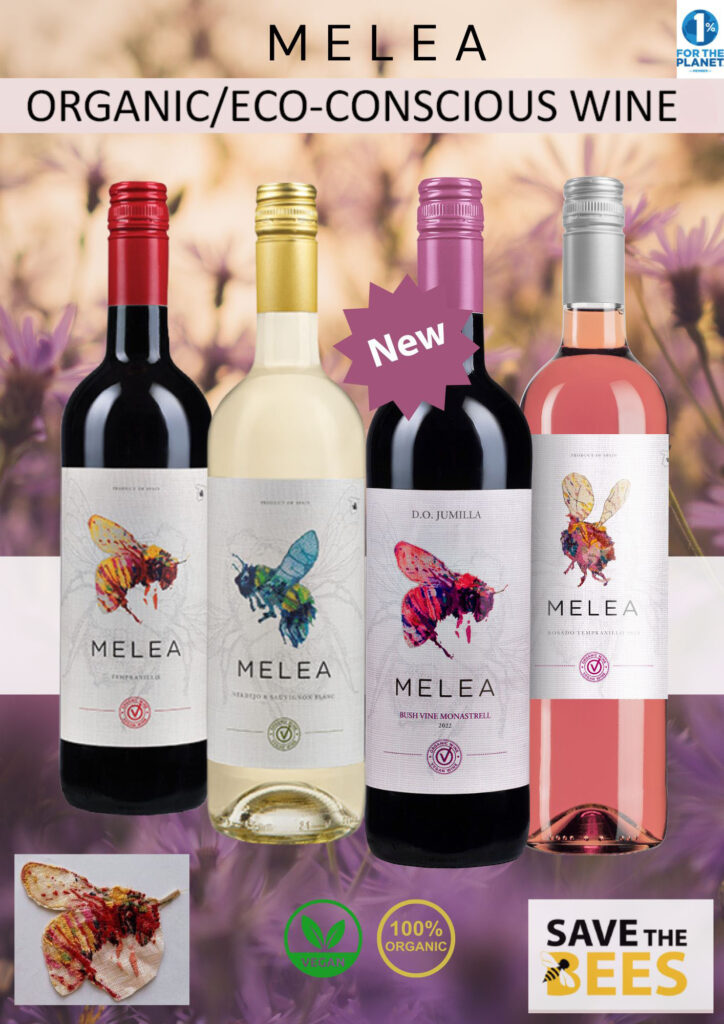 Ampersand Wines is committed to sustainability and organic practices in wine sourcing. This is evident in its introduction of Melea, a beautifully packaged range of organic and vegan wines with a unique story. Named after the rare bee Anthophora Melea, these wines represent a fusion of environmental consciousness and high-quality wines at everyday low prices.
Ampersand Wines is committed to sustainability and organic practices in wine sourcing. This is evident in its introduction of Melea, a beautifully packaged range of organic and vegan wines with a unique story. Named after the rare bee Anthophora Melea, these wines represent a fusion of environmental consciousness and high-quality wines at everyday low prices.
Hailing from the Cuenca area of La Mancha in Spain, Melea wines embody the essence of their terroir. The vineyard employs dry-farming methods and adheres to traditional vineyard management techniques, abstaining from toxic chemicals that could harm local wildlife, particularly bees and other insects crucial to the ecosystem.
What sets Melea wines apart is their reliance on natural yeasts for fermentation, a process facilitated by local insects, including the endangered Anthophora Melea bee. These natural yeasts, carried by bees as they pollinate the vineyard’s wildflowers, imbue the wines with distinctive flavours and aromas, reflective of their unique origins.
Melea Wines is also the first Spanish wine brand to become a member of 1% for the Planet – a global movement inspiring businesses and individuals to support environmental solutions. As a business member, Melea has committed to donate the equivalent of 1% of gross sales to directly support environmental non-profit solutions.
The collaboration behind Melea wines is as inspiring as the wines themselves. Managed by producers William Long and his wife Barbara Long, a mixed media artist who designed the bee motif for the label – the project is a testament to their shared passion for sustainability and artistry. Their son, Freddie, oversees the design process, ensuring that every aspect of Melea wines, from production to presentation, embodies their vision. The label’s attention to detail and commitment to sustainability have gathered acclaim, with Drinks Business Magazine recognising it as one of the standout wine launches in the UK.
With Melea wines, Ampersand Wines not only delivers exceptional quality but also sets a benchmark for ethical winemaking practices in the industry. If you would like more information or would like to stock Melea please contact your Ampersand Wines representative, call the Ampersand sales line on 01-4130150, or send an email to info@ampersandsales.ie.
Conscious of impact on the planet
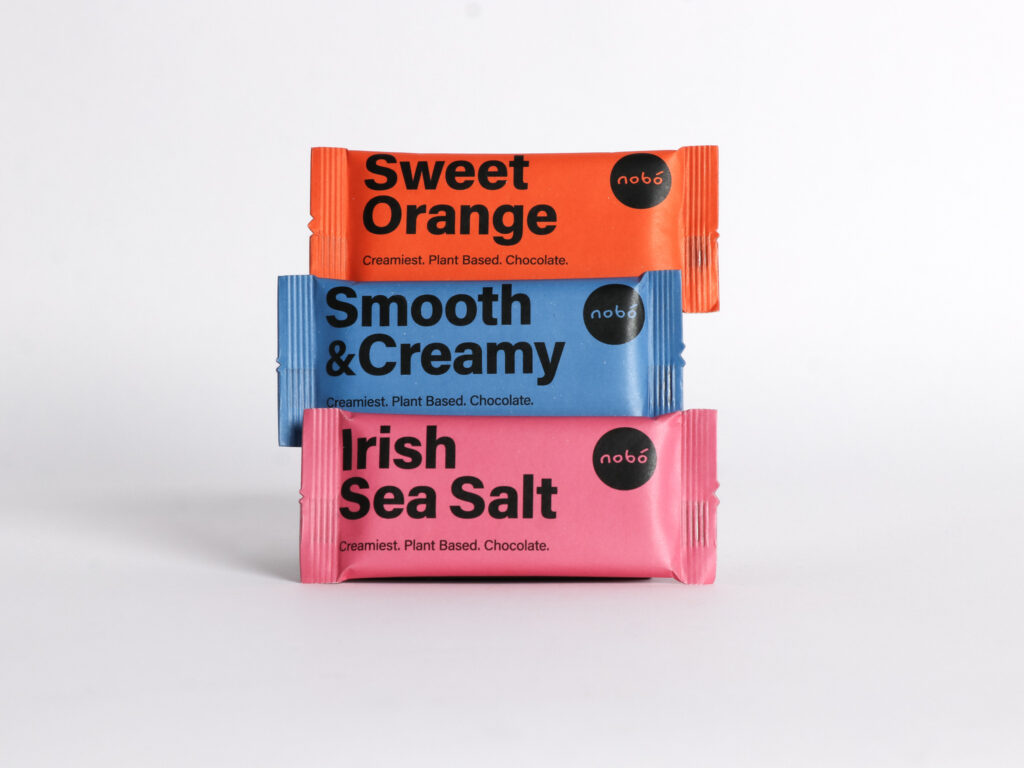
The innovative chocolate wrapper on Nobó’s 25g bars is made from fully compostable plant-based material
The mission at Nobó is to make better, healthier alternatives so the group takes great care in the suppliers it works with, and the ingredients it uses.
Nobó never ever use palm oil, refined sugar or artificial ultra-processed ingredients. Its plant-based chocolate is made using ethically sourced single-origin Cacao sourced from a family farm in Colombia which is certified BCorp.
Nobó works to create products with reduced sugar content, its chocolate is sweetened with Organic Coconut Sugar which has a Lower GI load, and it uses 50-60% less than typical milk chocolate.
The brand uses compostable packaging wherever possible and the innovative chocolate wrapper on its 25g bars is made from fully compostable plant-based material. Its inner foil style lining is made from a sustainable plantation of eucalyptus trees. Nobó is conscious of its impact on the planet and its kinder chocolate is plant-based and vegan-friendly. In its Ranelagh store, Nobó is plastic-free and uses compostable packaging for all takeaway items including seasonal items like Easter eggs.
New Nobó Protein Bites are launching next month.
Providing accurate carbon reporting to clients at a granular level
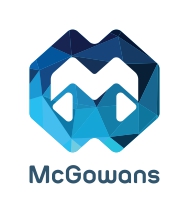
McGowans Print is Ireland’s leading business printing and large format printing company with locations in Dublin and Belfast. Here, we learn more about the business’s sustainability journey
Q: What are the main measures have you implemented recently to improve your sustainability credentials?
A: Our key measures include:
- Achieved independent measurement and certification of our carbon footprint by Carbon Quota, making us the pioneering Irish print and packaging company in this initiative.
- Installed 5000 square meters of solar panels on our roof, generating 25% of our power requirements.
- Replaced over 400 inefficient fluorescent fittings with LED lights for enhanced energy efficiency.
- Made a significant €6 million machinery investment in sustainable and innovative packaging production solutions.
- Implemented a thorough waste management system, separating and recycling all paper, card, and plastic waste.
- Utilised Carbon Balanced Paper to measure and offset our paper’s carbon impact through the World Land Trust’s initiatives.
Q: Why is sustainability such an important focus for your business?
A: Carbon accounting is the new modern currency in business decision making.
Driven by consumer behaviour and forward-thinking organisations, carbon accounting is here to stay. The transparency of how products are made and the impact they have on the environment, are rapidly moving to the top spot of decision-making. With our investment and adoption of Carbon Quota, we now provide accurate carbon reporting to our clients at a granular level, empowering our clients with relevant data and knowledge to expedite rapid and deep emission reductions
Our clients are seeking transparency on the carbon consumed in the manufacture of their requirements. They trust McGowans to provide credible independent labelling and scientific measurement standards. Clients want to make purchasing and product decisions driven by product carbon impact.
Q: What are the biggest challenges/hurdles to overcome for your business and industry to improve sustainability further?
A: “Style versus Substance”. Many in our industry make claims with well-worded and colourful strategies that often impress, but if these are not backed up with significant investment and changed ways of working, they are often meaningless and inaccurate.
At McGowans, we are following the path of scientific and reliable data: baselining our customers’ consumption, our own carbon footprint and measuring all future initiatives to record carbon reduction. A challenge for all industries is the lack of access to 100% green power supply. We need government to take a more ambitious approach to fast tracking national, certified green power so companies like ourselves can finally and truthfully lay claim to 100% green power supply. Our solar panel roof investment in 2022 allows us to certify only 23% of our total consumption, sourcing a certified supplier would remove 561 tonnes of carbon from our manufacturing footprint. This single move alone would drive us within touching distance of net zero emissions.
New record in preventing food waste
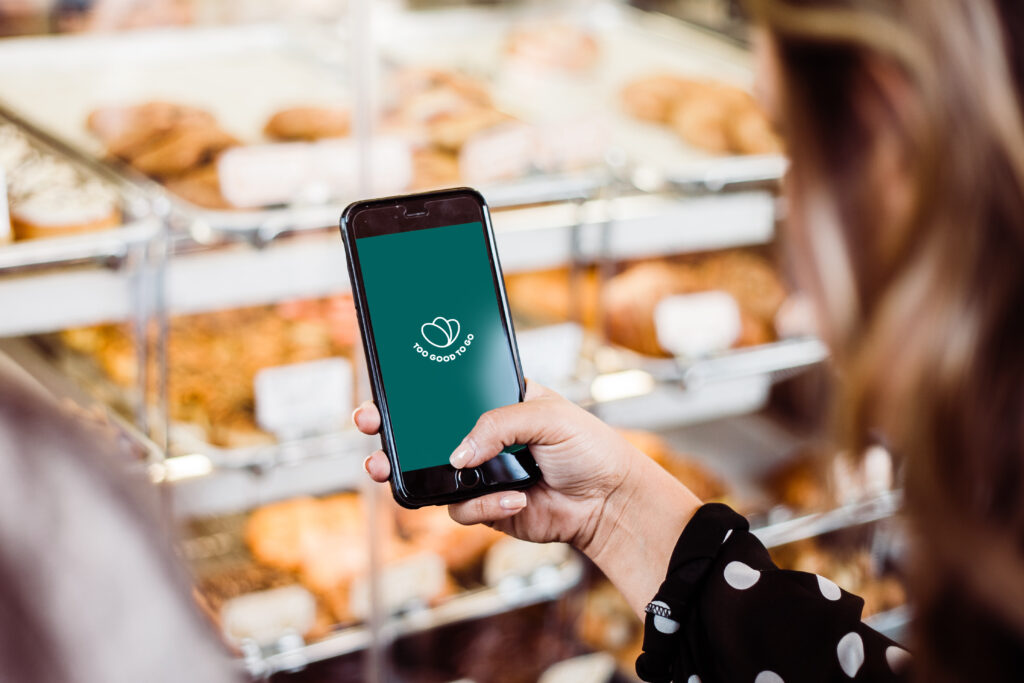
Since Too Good To Go’s launch in Ireland in 2021, the app has garnered an impressive user base of over 500,000 to date
Too Good To Go, the social impact company behind the world’s largest marketplace for surplus food, has recently published its 2023 Impact Report. The publication highlights a new record: Breaking the 100 million meals saved barrier in just one year by helping to save 121,686,720 meals from going to waste. This achievement demonstrates the success of Too Good To Go’s ‘win-win-win’ business model: Users get access to good food at great value for money; business partners unlock value from their surplus food; and together they make a tangible impact in tackling climate change by reducing food waste.
In Ireland in particular, since Too Good To Go’s launch in 2021, the app has garnered an incredible user base of over 500,000 to date. In 2023, an additional 953 new partners came on board, including Aldi and Supervalu, bringing the current number of food businesses on the marketplace to 1,800. In 2023 alone, Too Good To Go successfully saved 511,817 bags of food in Ireland, with the most active counties using the app being Dublin and Galway.
Most recently, the organisation also launched the Too Good To Go Platform – a new modular end-to-end surplus food management solution to enable retailers to unlock value from excess inventory. The platform encompasses five modules in a single interface, offering partners a pick-and-choose modular solution to tailor their surplus food management strategy. These modules include Expiry Date Management, Recommendations, Intelligent Discounting, Marketplace, and Donations.
Top tips to reduce food waste
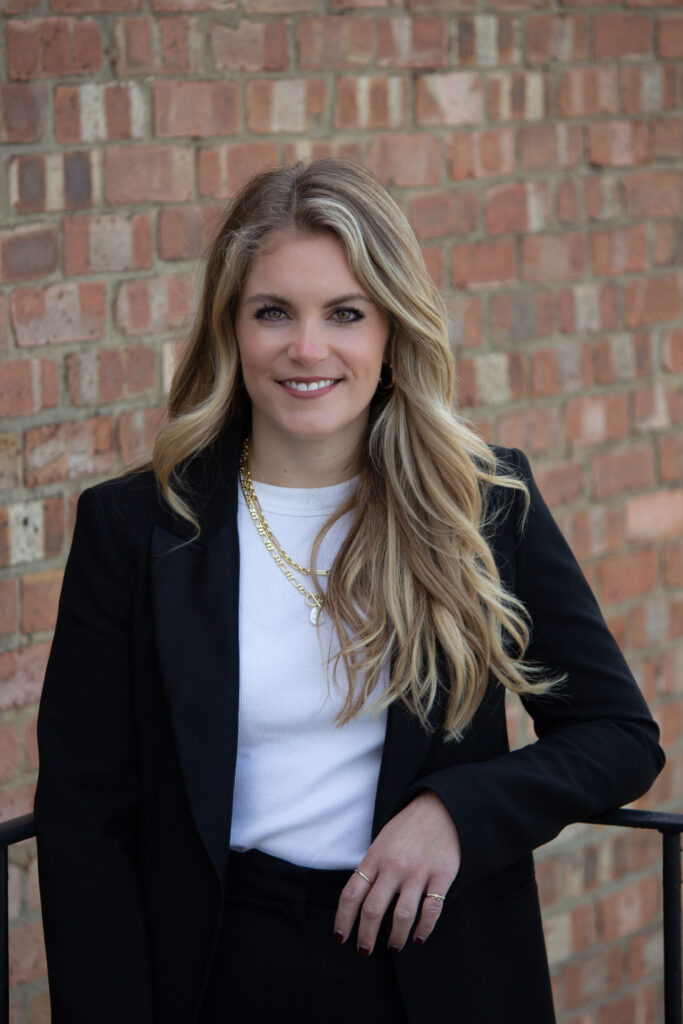
Sophie Trueman, country director, Too Good To Go
Too Good To Go recently shared some top tips on how to reduce environmental impact and making sure consumers get the most from their grocery shop, marking National Stop Food Waste Day which took place on Friday, 1 March.
Sophie Trueman, country director of the world’s largest surplus food app Too Good To Go, put together five top tips to save food from going to waste:
- Put a damp tea towel in with greens, like spinach or salad leaves: The moisture-wicking material stops excess moisture from causing the spinach to deteriorate prematurely.
- Store carrots and celery in water: The water keeps the water content of carrots high, ensuring they stay crisp and fresh.
- Be mindful of which foods you store together: Certain produce items release chemicals which can speed up the ripening for other fruits and veggies. For example, the moisture and gases released by onions cause potatoes to speed up their sprouting process, so while both veggies should be stored in the same conditions (room-temperature, dark, ventilated areas), they should be stored as far apart as possible.
- Remove the tops straight away: Sometimes, root vegetables like carrots or beetroots come with the top still attached. These draw away moisture from the root part of the vegetable, causing it to wrinkle and wilt more quickly. As soon as you get the veggies home, remove the leafy tops and set them aside to be chopped into a salad, boiled into a stock, or whizzed into a pesto or smoothie.
- Store raw vegetables in water to keep their crunch: Certain vegetables like carrots, celery or cucumber can go soft if left for a while. To avoid this, simply chop into sticks and place in a jar of cold water in your fridge (make sure it’s airtight!). Just remember to change the water every day or so to maintain the freshness. Top tip: this hack also works to revive vegetables that have already softened!
For more information, visit https://stopfoodwaste.ie/ and https://www.toogoodtogo.com.
Supporting sustainable farming
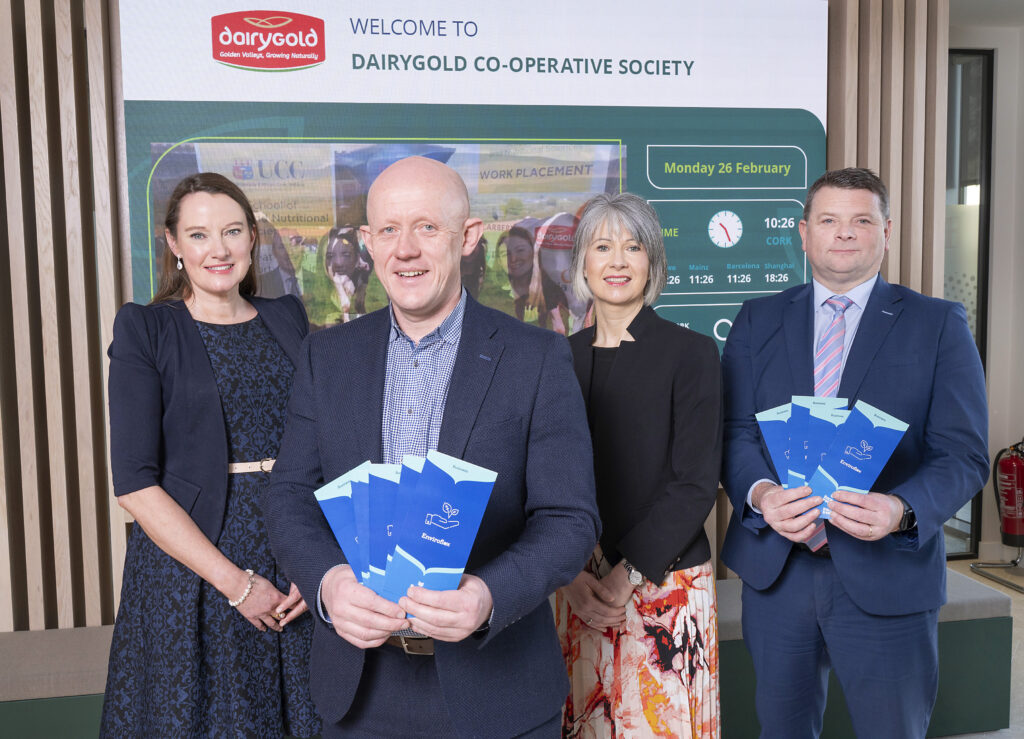
At the launch of Dairygold’s new Enviroflex partnership with Bank of Ireland were Orlaith Tynan, Dairygold Group head of sustainability; John Fitzgerald, agri manager, Bank of Ireland; Anne O’Mahony, Dairygold Group financial controller; and Liam O’Flaherty, Dairygold agri business general manager
Dairygold has announced a new partnership with Bank of Ireland to offer the Enviroflex loan package to Dairygold milk suppliers. Now available to over a third of all Irish dairy farmers, Enviroflex is designed to support Dairygold milk suppliers who are actively engaged in implementing environmentally sustainable initiatives to reduce their farms’ environmental footprint.
A sustainability-linked loan first launched in November 2023, Enviroflex has already proven popular with dairy farmers, with discounted flexible finance provided to farmers conducting milking parlour upgrades, installing wastewater and slurry storage facilities and investing in renewable and solar technologies.
As the leading lender to Ireland’s agriculture industry with over 82,000 farm customers on its books, it also furthers Bank of Ireland’s ambition of providing a range of sustainable finance products that are carefully designed to help make real, impactful changes.
Eligible applicants must be a member of Dairygold Co-Operative Society Limited and be a participant of the Dairygold Grassroots Sustainability Programme. Applicants will be required to provide evidence of participation in the Grassroots programme and will need to agree to provide Bank of Ireland with the carbon footprint of their farm.
“This agreement with Bank of Ireland is another example of the range of supports Dairygold has introduced to enhance our Milk Suppliers farm’s sustainability,” said general manager, Dairygold agri business, Liam O’Flaherty. “We will continue to work with our milk suppliers to make the transition to more sustainable farming easier for all involved. Working together with our stakeholders, including milk suppliers, members, customers and banks is crucial for us to meet our sustainability targets and make the future of farming more sustainable.”
“Bank of Ireland is the leading lender to Ireland’s agriculture industry and plays a key role in supporting the sector’s transition to lowering its environmental footprint,” added
John Fitzgerald, Bank of Ireland agri development manager. “We welcome Dairygold Milk Suppliers to the Enviroflex scheme, now available to over a third of all Irish dairy farmers.”
Enviroflex is part of Dairygold’s long-standing commitment to working closely with milk suppliers to promote the adoption of best practices in various aspects of dairy farming, including quality milk production, financial management, and sustainability.
Financing package details:
- The loan amount can range from a minimum of €10,000 to a maximum of €500,000.
- The interest rate is variable and is currently at a discounted market rate of 5.03% per annum, for those participating in the Dairygold Grassroots Sustainability Programme.
- Typically, unsecured loans are available for up to €120,000.
- Standard term of seven years.
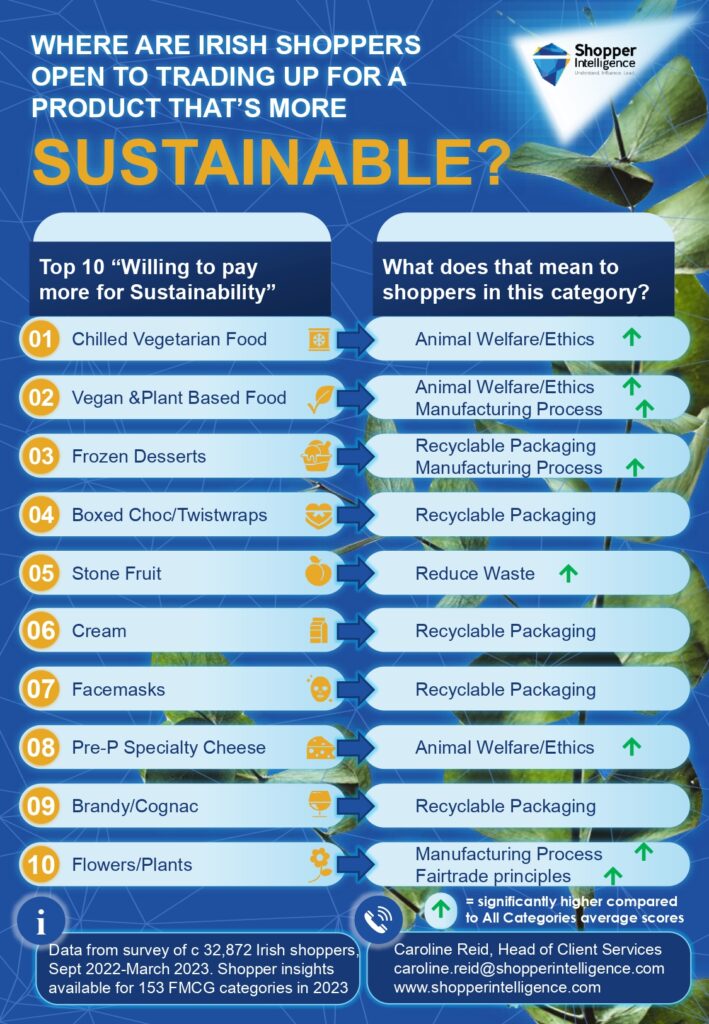



 Print
Print

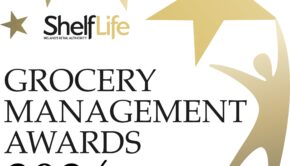
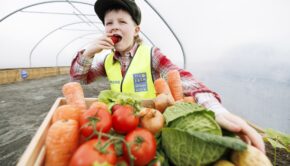

Fans 0
Followers